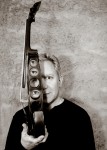On Thursday, more than 30 years of musical collaboration will reverberate off the walls of the Hammer Museum.
In addition to an esoteric musical style that crosses various genres, what really sets The Jeff Gauthier Goatette apart from other bands at the Hammer Museum’s summer JazzPOP series is its long history.
“I think one of the most amazing things about this group is that these guys have been playing together for so many years,” said Lisa Mezzacappa, the organizer of JazzPOP. “In jazz and improvised music, a really special chemistry emerges when people really know each other.”
Jeff Gauthier, violinist and founder of The Jeff Gauthier Goatette, said he first became exposed to jazz as a child. First learning violin from his aunt, he was further exposed to the form of music by his neighbor, who happened to be Thelonious Monk’s manager.
The Goatette evolved from a group started in the late 1970s with bassist Eric von Essen, drummer Alex Cline and his brother, guitarist Nels Cline, called Quartet Music, said Gauthier. They played together for about 15 years, after which von Essen and both Nels formed the core of the group with pianist David Witham.
The word Goatette is not only a spin-off of Gauthier’s name but also a means of accommodating changes in the makeup of a group that alters from a quintet to a quartet. In addition, Gauthier said, the title is a tribute to L.A. cornet player, Bobby Bradford, whose jazz group was called The Mo’tet.
The Goatette’s exact style is difficult to define because it emerges from musical influences such as European classical music, various folk forms, pure sound and progressive rock, Alex Cline said. A significant change that altered the style of the group was the influence of his twin brother Nels Cline, the electric guitarist of the band Wilco.
“With the addition of Nels Cline to the group in 2000, our sonic palette began to expand with the addition of electronic effects by him,” said Witham.
Even though the group has not been able to play together as much as in the past due to career and family, Cline said he is optimistic about the future of The Goatette.
“Sometimes taking a break helps because then it’s something that feels fresh,” said Alex Cline. “All the musicians in the group are really dedicated to playing this kind of music – playing it particularly in this group – and are also friends with one another.”
Cline also said the fluctuating state of jazz makes it difficult for groups like The Goatette to record and find venues to perform.
“Clubs and performance spaces come and go over the years. (Los Angeles) is kind of (in) a low time in that regard at the moment,” Witham said. “Since the recession, things haven’t come back as much as we’d like, both in terms of available venues and audiences showing up.”
Cline said both musicians and audience members can be exposed to each other through the Hammer as a venue and the expanded audiences its free concerts attract.
“I think that all of these different venues that add up to what a music scene is like in a city are really important,” said Mezzacappa. “You need a lot of different kinds of venues for a scene to feel vibrant and for the musicians to feel like they can do different things.”
Gauthier said that even among newer pop music forms, jazz has always managed to act as a bridge between popular music and what is deemed as art music. As a result, he continually derives his inspiration from jazz’s traditional environment of innovation alongside these new forms, even though the scene appears to have regressed.
“Some people think playing standards is a dead end, while others think playing completely free is a dead end,” Gauthier said. ”Anything can be a dead end unless you put your own creative energy into it. That’s why I try to be open to any music that comes along that moves me.”
At the Hammer, The Goatette will feature not only music from past albums but also improvisational work and a newly arranged piece by Gauthier. Happy to continually work with The Goatette after about thirty years, Gauthier said he also hopes to also create opportunities for young musicians through venues like the Jazz Bakery and the Hammer.
“Music ebbs and flows, and with places like the jazz series at the Hammer, the Blue Whale in Little Tokyo, and the new Jazz Bakery performance center in Culver City,” Gauthier said. “I’m hoping that jazz starts flowing in the right direction again.”
